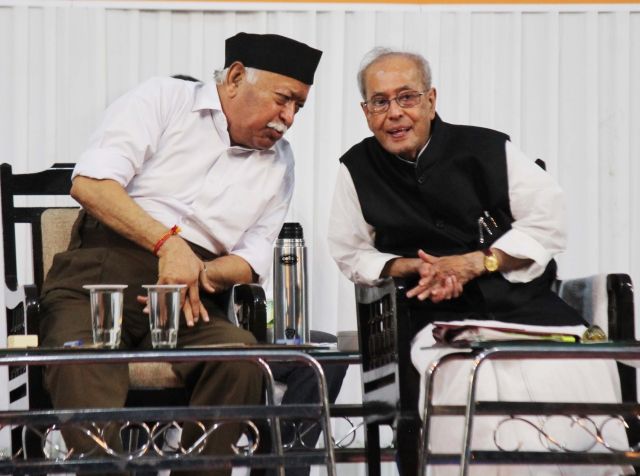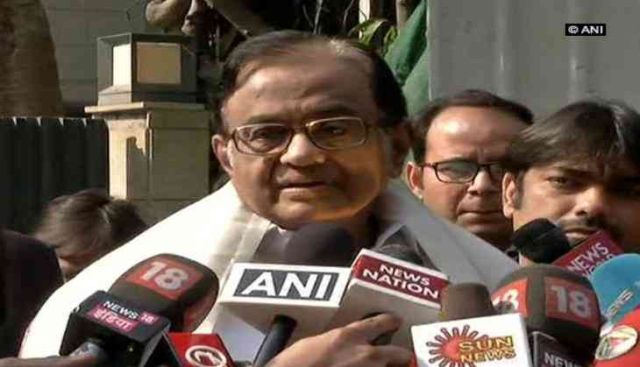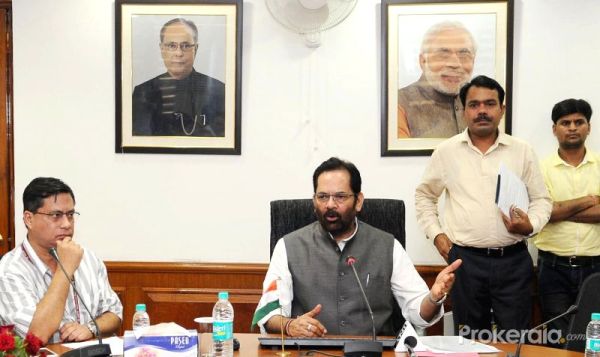
by admin | May 25, 2021 | Opinions
 By Tarun Basu,
By Tarun Basu,
The images from Nagpur were, in the words of a Congressman, hard to digest. Here was Pranab Mukherjee, a dyed-in-the-wool secularist, who had spent a lifetime in the Congress party, then became the President of India with the responsibility of upholding its Constitution, sharing the platform with, and enjoying the hospitality of, a person — and the organisation he heads, the Rashtriya Swayamsevak Sangh (RSS) — espousing values and ideals that are the very antithesis of all he stood and strove for his entire life.
“You were part of the government that banned the RSS in 1975 and again in 1992. Don’t you think you should tell us what was evil about RSS then that it has become virtuous now?” asked a middle-level Congress leader of Mukherjee after his controversy-tinged visit to the headquarters of the Hindu-first outfit that is the ideological mentor of the ruling Bharatiya Janata Party (BJP) of Prime Minister Narendra Modi.
Many in the Congress party, including his own daughter, questioned the wisdom of the former head of state and elder statesman accepting an invitation from the organisation that has been a bete noire to the left-liberal-secular establishment. Not just the committed, but even concerned citizens, have been voicing their anguish at the creeping climate of hate and prejudice in the country and blamed the ideology of the RSS and its affiliated Sangh Parivar outfits for the systemic attacks on minorities and suppression of the voice of socially oppressed groups. Many have voiced fears that if such venom was allowed to spread, it might end up tearing up the multireligious, multiethnic and multicultural social fabric of India that makes the country so unique.
“Today we are confronted with a politics of hate that has swept large parts of our country….. Muslims live in fear of the shape of the next round of attacks, even as the rights of Dalits and Adivasis enshrined in the Constitution are being questioned,” read the flier distributed at the #NotInMyName protests across the country in April after the brutal violations of young girls, allegedly by elements with affiliations to Hindu nationalist groups.
In this atmosphere of growing polarisation stepped in the 83-year-old Mukherjee, bearding the lion in his own den as it were, ignoring appeals by some old cabinet and party colleagues. In a speech that was followed nationally on live television, Mukherjee said that the “soul of India resides in pluralism and tolerance” and “secularism and inclusion are a matter of faith for us”. He reminded the RSS rank and file who preached a Hindu supremacist ideology and whose founder considered Muslims and Christians as “invaders” that “the multiplicity of culture, faith and language is what makes India special” and “any attempt at defining our nationhood in terms of dogmas and identities of religion, region, hatred and intolerance will only lead to dilution of national identity”.
Was Mukherjee wrong in going to Nagpur, in breach of the beliefs and values he is known to have held dear all through his half-a-century-long political career? A peek into his thinking was available in his address in which he expressed anguish over how “manifestations of rage” were tearing apart the national fabric. He said a “dialogue is necessary not only to balance the competing interests but also to reconcile them… only through a dialogue can we develop the understanding to solve complex problems without an unhealthy strife within our polity”.
Dialogue and accommodation are the cornerstones of democratic functioning and their absence have often sounded the death knell of democracy. In the celebrated book “How Democracies Die”, Harvard professors Steven Levitsky and Daniel Ziblatt talk about how “extreme partisan division” in American democracy today — following the norm-breaking tenure of President Donald Trump — was being fuelled not just by policy differences between the Republicans and Democrats “but by deeper sources of resentment, including racial and religious differences” and was eroding the “guardrails of democracy”.
India today stands similarly at a crossroads, unprecedented perhaps in its 71-year history. As the national discourse becomes heated by the day, with a permissive social media often fanning the division and hatred between the two extreme partisan ideologies, the growing slugfest and the low level of the debate is leading to a gradual disillusionment with democracy among ordinary citizens, particularly the youth, who yearn for change and progress.
With the country headed towards what could be one of the bitterest elections in recent history, not only between sworn political rivals but between ideologies that are fundamentally at odds with each other in their national outlook and their very definition of who is an Indian, the partisan polemics over every issue and policy of national concern is eroding India’s fundamental unity. If India, an exemplar of democracy, were to fragment on religious or caste lines, analysts say it could have a devastating effect on the region and the rest of the world.
And that is perhaps why Mukherjee felt he had to step in to bridge the deepening chasm in the national discourse and plead for dialogue. Whether the canny former politician did it with any eye on the next elections — in politics, as Franklin Roosevelt said, nothing happens by accident — may not be known immediately, but to denounce his visit as self-serving and a betrayal is to lose sight of the fundamental tenets of democracy which the world has come to value in India.
“Messy as it may be, India’s political system may be credited with great achievements,” The Economist said in one of its recent columns referring to a Pew Global survey which found Indians to be less enthusiastic about democracy and more drawn towards having a strong leader or military rule than citizens of any other democracy surveyed. “It has helped hold a huge and almost impossibly diverse country together. It has kept the army out of power. And it has upheld civic freedoms that, for all their fragility, remain the envy of many of India’s neighbours.”
(The author is a veteran mediaperson. The views expressed are personal. He can be contacted at tarun.basu@spsindia.in)
—IANS

by admin | May 25, 2021 | Economy, Finance, News, Politics
 New Delhi : Former Finance Minister P. Chidambaram on Monday said the BJP government’s “administrative incompetence” and “policy blunders” were responsible for the rising farm distress, unemployment and failure of economy.
New Delhi : Former Finance Minister P. Chidambaram on Monday said the BJP government’s “administrative incompetence” and “policy blunders” were responsible for the rising farm distress, unemployment and failure of economy.
“Farmers’ despondency has turned into anger and they have come to streets to protest,” the senior Congress leader told reporters here.
“The principal reasons are uneconomic price for farm produce and stagnant wages of farm labour. MSP (Minimum Support Price) is not adequate. Every farmer knows that the promise of MSP = Cost + 50 per cent is a ‘jumla’,” he said.
Chidambaram said the Reserve Bank of India’s confidence survey stated that 48 per cent felt that the economic situation of the country had worsened in the last 12 months.
He said unemployment was rampant in the country, which was “far cry” from the Bharatiya Janata Party’s promised two crore jobs a year.
Chidambaram questioned why the Labour Bureau Survey for October-December 2017 not yet released.
Chidambaram said demonetisation had caused the growth rate to decline from 8.2 per cent in 2015-16 to 6.7 per cent in 2017-18.
“The Tamil Nadu government has officially acknowledged that 50,000 MSME units were shut down in the state in 2017-18; 5,00,000 jobs were lost; and capital investment in the MSME sector declined by Rs 11,000 crore,” he said.
A flawed Goods and Services Tax continues to haunt trade and business, he added.
Chidambaram said the social security laws and programmes have been neglected by the BJP-led central government.
“The Food Security Act has not been implemented. MGNREGA is no longer demand-driven, wage arrears have mounted. Crop Insurance covers barely 30 per cent of farmers, it is a windfall for insurers. Health Protection Scheme is another ‘jumla’,” he said.
—IANS

by admin | May 25, 2021 | News, Politics
 New Delhi : The BJP MLAs on Friday alleged that a file related to Jan Lokpal Bill has been stuck with the AAP government for the past nine months — a claim that was not directly countered by the latter.
New Delhi : The BJP MLAs on Friday alleged that a file related to Jan Lokpal Bill has been stuck with the AAP government for the past nine months — a claim that was not directly countered by the latter.
A strong Jan Lokpal Bill (an anti-corruption Bill) was one of the main planks on which the Aam Aadmi Party (AAP) fought the election and came to power in Delhi.
Replying to the allegation, Deputy Chief Minister Manish Sisodia said the Central government sat on the Bill for around 21 months and after that they raised the point whether the Delhi Assembly has the power to pass the Bill.
Three Bharatiya Janata Party (BJP) legislators walked out of the House to register protest after their request for a reply on the Bill being allegedly stuck with the AAP government was turned down.
The MLAs then sat on a dharna outside Chief Minister Arvind Kejriwal’s office in the Assembly, seeking an apology from him on the issue.
In a letter to Kejriwal, Leader of Opposition and BJP MLA Vijender Gupta and MLAs Manjinder Singh Sirsa and Jagdish Pradhan demanded that the file related to the Bill be tabled in the Assembly without any delay.
“You (Kejriwal) knew about all this. Despite this you are intentionally delaying it,” the letter read.
Outside Kejriwal’s office, Sirsa said: “The Bill is being delayed to save Satyendar Jain. We will fight for Jan Lokpal Bill and implement it. We will also bring down Kejriwal from power and send Satyendar Jain to jail.”
The BJP legislators also made available a purported official history of the file related to the Bill, which showed that it was pending with the Delhi government as on Thursday.
The Jan Lokpal Bill was passed by the Delhi Assembly on December 4, 2015.
Sisodia said that on August 23, 2017, the Centre said in a reply that the Central government’s department concerned was looking into the Bill.
“However, the technical issue regarding the lack of competence of the Delhi Assembly needs to be further deliberated,” the Central government’s response said, according to Sisodia.
He said the Bill would have come into effect in a month’s time if Delhi was a full state.
—IANS

by admin | May 25, 2021 | Economy, News, Politics
 Panaji : The government is worried about the rising fuel prices, Union Minority Affairs Minister Mukhtar Abbas Naqvi said here on Sunday.
Panaji : The government is worried about the rising fuel prices, Union Minority Affairs Minister Mukhtar Abbas Naqvi said here on Sunday.
“Along with the people, even we are worried when the price of petrol, diesel, LPG, increases. When our party was in the opposition, we had opposed any hike in petroleum because the price of the crude oil was very low in the world market.
“As far as the current hike is concerned, the Petroleum Minister has clearly said we are working in that direction (to ease it) and that it is a worry,” he said in response to a question from the media here.
Naqvi was in Goa as part of the ruling BJP’s ‘Transforming India’ campaign under which senior leaders have fanned out across India to amplify the achievements of four years of the Modi government.
—IANS

by admin | May 25, 2021 | News, Politics
 Panaji : Minorities are safer in India than in any other democratic country, Union Minister for Minority Affairs Mukhtar Abbas Naqvi said on Sunday, accusing “some political forces” of trying to use isolated incidents to disturb India’s social fabric.
Panaji : Minorities are safer in India than in any other democratic country, Union Minister for Minority Affairs Mukhtar Abbas Naqvi said on Sunday, accusing “some political forces” of trying to use isolated incidents to disturb India’s social fabric.
“Minorities and their socio-economic, educational and religious rights are safer in India than any other democratic country. Therefore, if some people are trying to create an atmosphere (of fear), I do not think they will succeed,” he told the media here.
Naqvi, who is in Goa as part of the Bharatiya Janata Party’s ‘Transforming India’ campaign, said no major communal riot happened under the National Democratic Alliance rule.
“Unfortunately some forces, especially political, are trying to create an atmosphere of fear to disturb the development, peace and prosperity. Some isolated criminal incidents have definitely happened and they have been timely acted against. Those who were responsible have been imprisoned,” Naqvi said.
In response to a question as to whether communally sensitive issues like Hindutva and construction of the Ram temple at Ayodhya would be part of the BJP’s 2019 poll campaign, Naqvi replied in the negative.
Naqvi also blamed the Congress for stalling the passage of the law banning triple talaq among Muslims.
“Triple talaq has nothing to do with religion. It is an ill-practice and should be banned and, therefore, the bill was passed in Lok Sabha. Unfortunately, the Congress and their allies are stalling it in the Rajya Sabha. Our attempt will be to pass it in the Rajya Sabha in the coming session,” Naqvi said.
—IANS





